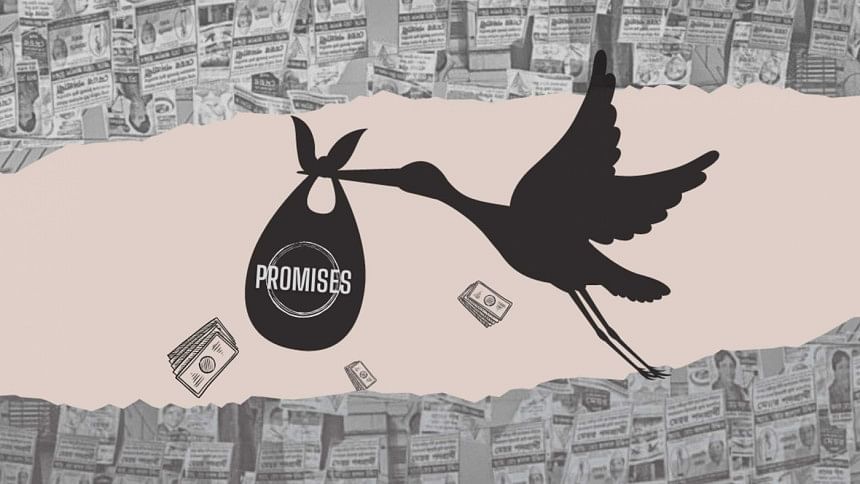Pre-election promises, post-election disappointments

According to a recent report, due to the insistence of lawmakers, the government is going to repair religious establishments and build new bridges across the country at a cost of Tk 5,132 crore. Under two separate projects, 17,321 mosques, temples and pagodas will be renovated, while bridges will be constructed in 35 districts of the eight divisions. The timing of this is most interesting, as it comes with the next parliamentary elections barely a year and a half away.
There is nothing wrong with the government renovating public places of worship—even though given the number of problems that we currently have, particularly the crisis of skyrocketing prices of essentials amidst rising poverty, it could be argued that the people would be better served with the government focusing these resources elsewhere, and leaving the renovation job to the devotees. Equally, there is nothing abnormal about the government trying to win people's hearts by announcing such feel-good projects with the elections nearing—it happens nearly everywhere in the world.
The issue is with how efficiently the government utilises these public resources and how well it delivers on its promises. It is perhaps here that the main worry starts.
Before the 2009 elections, the current ruling party promised that people would be able to buy rice at Tk 10 per kg—a promise that never materialised. The question is, why promise something that cannot be delivered?
Similarly, before the last general elections, this newspaper reported how people in the char areas of Lalmonirhat felt abandoned because of broken electoral promises about their development as announced over the decades. According to 100-year-old Afsar Ali, "When election comes, agents of political parties and MPs come with a list of promises and seek votes but all of it vanishes as soon as the results are out." According to another resident of the area, before the 2014 elections, the supporters of one MP promised them "electricity and dyke in the river but nothing has been done till date [even though four years had passed]."
Before the 2018 general elections, with many significant promises from previous election campaigns still remaining on paper, the ruling Awami League came out with a number of fresh and ambitious promises. Among them was following a policy of zero tolerance for corruption, forming a stronger electoral system through reforms, alleviating poverty, creating employment, ensuring a service-oriented and accountable administration, and putting more focus on infrastructure development. Pointing to the protest for safer roads that was still fresh in our minds at that time, the prime minister herself vowed to bring discipline in Dhaka's transport sector by introducing "modern bus services to curb indiscipline in Dhaka's mass transport service." Sadly, looking at the state of Dhaka's roads today, one may find it hard to believe that such a promise was ever made.
Politicians breaking electoral promises is an age-old problem. However, the way that problem is supposed to be counteracted is through voters holding their elected representatives accountable. It is the fear of being voted out that primarily keeps public representatives honest. But to expect that they'd deliver on their words out of the goodness of their hearts is at best naïve, and history testifies to that.
It is here that we've failed. Because our elections are mostly not free and fair, and thus deny people their right to vote out public representatives who made false promises, the problem of politicians not delivering on their words continues to plague us. And the cost of this—besides depriving people of their most basic democratic right to choose their own representatives—is proving to be more and more enormous by the day.
Over the years, the endless number of government projects that have seen their cost and deadlines revised is simply ridiculous. If we look at just the road sector, according to a 2017 World Bank report, Bangladesh has one of the highest road construction costs in the world, even though the quality of these roads was really bad. According to Sarwar Jahan, a professor of urban and regional planning at Bangladesh University of Engineering and Technology (Buet), a major issue here is the involvement of politicians with many construction firms. People are extremely reluctant to hold these firms accountable as they are backed by individuals having significant political clout.
And who can blame them? If politicians could be held accountable—through fair elections—then these firms could be held accountable too, which would then have the incentive to finish projects on time, stay within the cost estimates and provide high-quality work (as they might otherwise fear losing future government contracts). But that is not the case. As a result, most development projects finish much later than originally scheduled, while their costs double, triple or even quadruple.
The amount of public money that continues to get wasted could truly transform this country. But the truth is, it is the tendency of politicians to be corrupt, apathetical, and lacking in vision and wisdom that is holding us back. The only way to reverse this is to regain our right to freely vote for whoever we want to represent us. That, however, is easier said than done.
In the meanwhile, it is the responsibility of the independent media to continue highlighting the broken promises of political parties and their members. The public should also strongly voice their disapproval of such a state of things, and clamour for the restoration of their rights and for the wastage of their hard-earned money to stop.
Eresh Omar Jamal is an Assistant Editor at The Daily Star. His Twitter handle is: @EreshOmarJamal

 For all latest news, follow The Daily Star's Google News channel.
For all latest news, follow The Daily Star's Google News channel. 



Comments